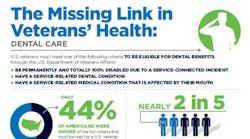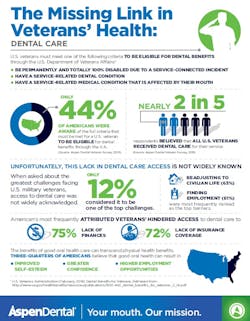Remembering the need for dental care this Veterans Day, Nov. 11
At my dental practice, I see veteran patients who are in urgent need of dental care due to pain caused by years of delaying their oral health care. As a veteran myself, this issue is acutely personal, yet it is one that is largely unknown to the general public.
While medical benefits are available to all active duty members and veterans through the U.S. Department of Veteran Affairs, dental benefits are not. In fact, veterans do not receive government dental benefits unless they are classified as 100% disabled, have a service-connected dental condition, or have a service-oriented medical condition that is affected by their mouth. These are requirements that many veterans do not meet.
Only 12% of respondents considered access to dental care to be one of the top three challenges veteran’s face—important issues like readjusting to civilian life (63%), finding employment (61%) and accessing medical care (47%) ranked at the top. However, what the general public doesn’t realize is that these other significant challenges are directly tied to oral health.
As we all know, the benefits of good oral health are not only physical—as a proper smile can improve self-esteem—they also invoke greater confidence and provide higher employment opportunities, which three-quarters of Americans agree with.
It’s clear that our nation’s veterans need help in breaking down barriers to access dental care. It’s why hundreds of my peers and I volunteer with Aspen Dental’s Healthy Mouth Movement, where we help give several veterans free dental care throughout the year. There was one veteran in particular who truly made an impact on me. After helping to restore his smile, his unbridled enthusiasm was evident, and today he’s helping his fellow veterans with their transition by volunteering at a suicide hotline.
The reality is that fixing a mouth can sometimes fix the whole person, giving someone the boost they need to improve other aspects of their lives. Providing them the help they need, specifically dental care, is key in helping veterans transition back into civilian life and continue to serve our communities.


